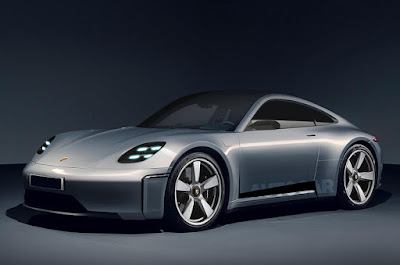Porsche is believed to be working on its all-electric 911, as part of its plan to transform itself into a mega electric vehicle (EV) company — powered by solid-state batteries — within a decade.
The upcoming Porsche 911 EV may come with the lithium metal solid-state battery supplied by QuantumScape.
The battery manufacturer has been doing research on solid-state batteries for electric vehicles for quite a while.
QuantumScape is a US-based company where Volkswagen AG, Porsche’s parent company, has made huge investments.
Volkswagen pumped $100 million into QuantumScape in 2018, and again, $200 million more in 2020. So far, the US firm has managed a whopping $1 billion in additional funding.
QuantumScape wants to use the proceeds for making solid-state batteries for automotive applications.
Also, since Volkswagen is its stakeholder, QuantumScape can quickly put its battery to test and commercially produce it whenever viable and safe.
Volkswagen is aiming to be a mega global player in EVs, and Porsche is among Volkswagen brands that is planning to be an early user of solid-state batteries, which are believed to be the most energy-efficient and high-energy-density EV batteries.
Porsche 911 EV would debut before the end of this decade. This could imply that Porsche may bring a new generation of the 911 internal combustion engine (ICE) variant before fully transforming into the electric powertrain.
Porsche chief executive officer (CEO) Oliver Blume had said that he would rather prefer to roll out a hybrid 911, instead of a fully-electric version car.
Toyota is also working on solid-state batteries and plans to use the technology in its future editions of the Prius, at least in the initial stage. It would later introduce it on pure-electric cars.
Porsche now sells its Taycan EV, which is the carmaker’s first all-electric car. The 911 EV, when rolled out, would be a key model in the brand’s portfolio.
The Taycan’s prices start at Rs 1.5 crore (Rs 15 million) and go up to Rs 2.3 crore (Rs 23 million).
The Taycan was introduced in India in November last year and can go up to speeds of 230-260 km. It offers a range of 400-450 km (248-280 miles), depending on the variant.
Advantages of solid-state batteries
A solid-state battery has a higher energy density compared to a Li-ion battery, which uses liquid electrolyte solution.
The solid-state battery doesn’t have any risk of explosion or fire, and hence, there is no need to have components for safety. So, it can save more space.
There will be increased stability with this battery, which implies faster charging. This does away with the need for bulky safety equipment.
Solid-state batteries can hold more energy compared with liquid Li-ion batteries. This would help in the quick and seamless switch from gasoline vehicles to EVs.
But one disadvantage of solid-state batteries is that they cost nearly eight times more compared to Li-on batteries. Also, they are difficult to mass produce right now.
Conclusion
So, luxury car buyers could lap up the 911 EV (with the solid-state battery) not only in India but globally mainly because of the safety factor, which could be a game changer for this Porsche electric vehicle.


I read the above article and I got some knowledge from your article. It's actually great and useful data for us. Thanks for share it.Car Charging Infrastructure
ReplyDeleteThank you
ReplyDelete